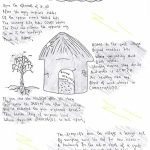As the afternoon approaches – when the sun is most resplendent – the village maidens anticipate fetching water at the river. The river is a momentous juncture where they gather to bask in the bloom of their vitality and sup from the fountain of youth.
Noqhayiso hears the freewheeling chatter and laughter of her peers as they pass by; headed down the river. She picks up her clay water pot and joins the bevy of young women.
Zimile, their iqhikiza, deliberately falls behind to have a word with Noqhayiso.
“You came!”
“We need the water at home.”
“Your father needs the cattle too.”
Noqhayiso sighs. “Zimile, you already know my heart.”
“No, Qhayi,” Zimile prefers her shortened name. “Not under my leadership. I will not let you marry into poverty. Don’t embarrass your family.”
“The heart can’t be dictated,” she counters; defeated.
“If we all tended to matters of the heart, our duties would be abandoned.”
“Living with an unfulfilled heart is worse than death. I’d pick death any day.”
Zimile laughs. “There you go again with your childishness.”
One of the girls walking ahead of them belts out a high-pitched love-song about runaway lovers. Her consorts happily receive the chorus.
Teary-eyed, Noqhayiso sings along to the rebellious lyrics.
Zimile grabs Noqhayiso’s arm. She understands Noqhayiso’s dilemma. She, too, is conflicted between duty and amity. She sympathises with Noqhayiso, but the village elders made her the maidens’ mentor because they trust her.
Yesterday’s unfortunate incident haunts Noqhayiso like foul odour. She couldn’t even manage sufficient sleep as she worried about Mthunzi’s condition after his nasty fight with Sijeza. As Sijeza’s bamboo club constantly landed on Mthunzi’s head, all she remembers is the pool of blood that spilled out. She must have screamed her lungs out because Zimile and the other girls who’d just left Noqhayiso behind rushed back to drag her home.
* * *
“Sijeza wishes to speak with you,” Zimile tells Noqhayiso.
“Haybo dadewethu, about what?”
“Lend him your ear and you will know.”
“Has he your permission?”
“Qhayi, I know a lot of girls who’d die for this moment.”
“Clearly I’m not one of them! Mother is waiting for water at home. You know that?”
“One day your beauty will recede then you’ll regret turning down all these fine suitors.”
“Is that a threat?”
“Please don’t dally. We don’t want to upset your mother.”
“Don’t worry. My encounters with Sijeza never last.”
Both girls laugh. Noqhayiso helps Zimile to lift her clay water pot to her head. She leaves.
Sijeza confidently emerges from behind the bush – a bully young man who’s swollen-headed. As the commander of Amaphehlantuli – the dust raisers – a regiment of the village tribe’s young men, he sure behaves like someone who’s used to having his way.
A dog tags along Sijeza. Upon laying her eyes on the hideous canine, Noqhayiso is startled – she drops her clay water pot and it breaks into pieces. Sijeza laughs. He enjoys eliciting fear from his subjects. Noqhayiso trembles with fright.
“Please get that dog away from me.”
“I and my dog come in peace, and with love.”
“Sijeza, please, I beg you…”
The desperation and vulnerability in Noqhayiso’s voice arouses Sijeza. He’s never seen her like this. Always, it’s him who must beg her.
“Agree for me to bring lobola to your father and I’ll get the dog away.”
“This isn’t a game!”
“Then stop playing hide and seek with me. You know my father’s kraal is the largest in the region. Your family must name their price and I’ll happily pay. Isn’t it so, Tindo?”
At the mention of its name, Sijeza’s dog barks excitedly. Noqhayiso shrieks. Music to Sijeza’s ears. He clamps her wrist with his gigantic hand.
“Let go of me! You’re hurting me!”
Mthunzi comes running. He’s been keenly watching from a distance. Every afternoon he comes to the river to quench his heart’s thirst. In the village, it is normal for young men to strategically flock the rivers where the maidens gather.
It is here, at the river, that suitors serenade the young ladies they’ve set eyes on. It is here that the maidens prance with pride in the fullness of their youth. Down the river is where the village’s colourfulness congregates to birth the brightest of destinies. Also, it is here that beauty and evil meet – colliding into a calamity.
On most occasions, Mthunzi often returns home without getting the opportunity to indulge Noqhayiso because of her vigilant iqhikiza, Zimile, who controls access to the most sought-after maiden in the whole region.
Sijeza and Mthunzi are Noqhayiso’s fiercest pursuers.
Mthunzi is particularly less fancied by Zimile, probably because of his laughable family background. Some days Noqhayiso drags her feet just so she can steal a few moments with Mthunzi, whose venerate approach and witching poetry has inseminated a seed unto Noqhayiso’s heart that is nicely bursting forth. This inner bloom has manifested into an outer glow that’s effectually enhanced Noqhayiso’s already distinctive beauty.
“You heard the lady, man, let her go.” Mthunzi calmly tells Sijeza.
“Or what? Huh, herds boy?” barks Sijeza.
Mthunzi ignores the effervescent Sijeza. He focuses his kind eyes on Noqhayiso who is squirming like a fish out of water as she tries to free herself from Sijeza’s grip. The dog agitatedly circles Noqhayiso. She is terrified of dogs.
Mthunzi hits Tindo with his accessorial club that is wreathed with beadwork. The dog howls away, tail between legs. This angers Sijeza. He lets free of Noqhayiso and faces Mthunzi.
“Are you okay, my lady?” Mthunzi asks.
She nods. “Thank you,” mumbling.
Mthunzi looks down at the broken clay pot’s pieces. He pities her: she’ll return home late and without water.
“Let’s see how much of a man you are,” Sijeza flexes his bamboo club. “A hero who hits dogs,” he sneers.
That is how the fight starts. Sijeza unleashes his wrath while Mthunzi attempts to protect himself from harm.
***
At the river, the young women happily go about their affairs, away from the inculpate eyes of the elders. Zimile knows every detail of their intimacies; she’s one of them, after all. They cherish sisterhood. Events that occur at the river strengthens their bonds. The river is the only space where they can assuredly and deliriously live their truth at heartsease.
Water is life – it unites people. Sometimes water is perilous – it claims lives. Still, elders send their daughters – the village’s flowers – to the river, hoping they’ll return the same as they left; if they return. It is therefore imperative for those who drink form the same river to unite.
Noqhayiso’s heart jumps with joy and panic when she notices that Mthunzi is present at the river today: he’s concealed himself under a tree away from the river. Only someone who knows where to look for him can spot him. She boldly defies norm and asks Zimile if she can go to Mthunzi and apologise for getting him injured. After deliberate contemplation, the iqhikiza consents.
“I’ll be waiting over here. Make it quick.”
Noqhayiso smiles with gratitude. She heads for the tree at once.
“Qhayi!’ Zimile calls out. “Careful of his tongue.”
Noqhayiso feigns misunderstanding. Too late for that, sister. She intently strolls over to Mthunzi – surefooted.
Mthunzi’s head is a tatterdemalion of fresh wounds. He looks charming nevertheless in his specially customized traditional regalia that’s characterized by agreeable accessories. Under the watchful eyes of Zimile, not much is said between them, but their eyes indemnify all uncertainty. She presents him with a brightly beaded necklace.
Unfortunately, Zimile sees the gesture. She’s disappointed at Noqhayiso for legitimately validating her love for Mthunzi without first consulting her.
Zimile decides to expose Noqhayiso. She warns Noqhayiso’s parents. Her father, especially, is aggravated. He hastily organizes lobola negotiations with Sijeza’s family. He will not marry off his daughter to necessitousness.
The lobola day arrives. Noqhayiso wakes up very early to go bathe at the river in preparation for the ‘big day’. When she doesn’t return, they send for her. They find her lying dead by the riverside with a dagger through her heart.
Every afternoon, Mthunzi religiously visits the river to gather his senses. The villagers claim that his sanity deserted him right after he learnt of Noqhayiso’s tragic death. Alone with the heartening warmth of the sunset, he enjoys the uninterrupted company of his dearest Noqhayiso. His Noqhayiso – the rose that withered at day-break and never fulfilled its bloom in the bask of sunlight. She married death, so goes the local adage.
The villagers have since deserted the river after blood flowed within it. And now, Mthunzi drinks from this abundant fountain – the only river that can cure the hangover of his youth. So, it is that he frequents the river, without fail, to relive the memories that he refuses to let go of.
“If water is life, then I shall drink from this river until the last days of my life.”
He asserts a resolve of many moons ago before his hair even began to gray.
This post was created with our nice and easy submission form. Create your post!






